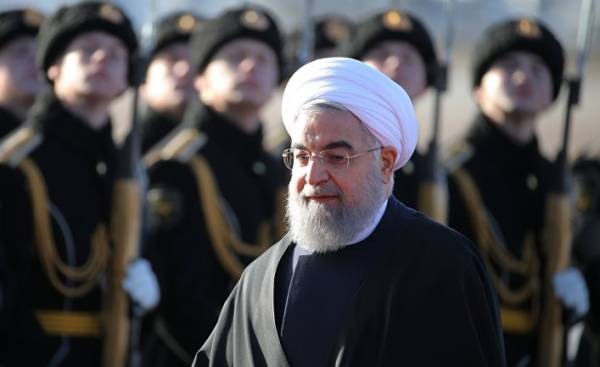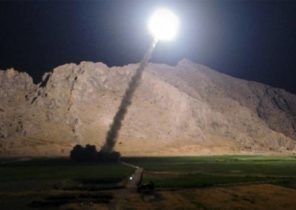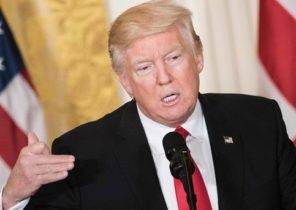
A few weeks ago, the President of the United States Donald trump and his advisers endorsed the position of Saudi Arabia, accusing Iran of turning into the epicenter of middle East terrorism.
Meanwhile, the U.S. Congress is again preparing a new round of sanctions against Iran. However, the grotesque idea of Iran as the “vanguard” of global terrorism, as expressed by Saudi Arabia’s king Salman, is not just incorrect but also extremely dangerous because it can lead to another war in the middle East.
Moreover, it seems, is the aim of some hotheads in the United States, despite the obvious fact that Iran is on the same side with the U.S. in combating the Islamic state (ISIS). There is another fact that Iran, unlike most of its regional rivals, is a working democracy. And the irony is that the escalation of American and Saudi rhetoric against Iran has begun just two days after the 19 may in this country were elections in which the moderate forces, headed by the current President, Hassan Rouhani defeated his opponents, the hardliners.
It is possible that trump’s Pro-Saudi,anti-Iranian position is just another business project. He was glowing, when Saudi Arabia decided to buy from America new weapon in the amount of $110 billion, said the transaction “new jobs” as if the only income-generating employment for American workers inevitably requires them to incite war. And who knows what other private transactions of trump and his family may be hiding for his warm support of Saudi militancy.
Bravado of trump administration in Iran in a sense, are a continuation of the habitual lines. American foreign policy is literally littered with absurd, tragic and highly destructive wars abroad that serve no real purpose, and a desire to implement the misconceptions of the official propaganda. How else, in the end, you can explain useless and extremely costly involvement of America in Vietnam, Afghanistan, Iraq, Syria, Libya, Yemen and many other conflicts?
America’s hostility towards Iran has been started since the Islamic revolution that occurred in this country in 1979. American society is the seizure of the us Embassy, which for 444 days were taken hostage by radical Iranian students was the psychological shock that still has not passed. The dramatic theme of the hostages dominated the American media since their capture and release that led to a kind of post-traumatic stress in the whole society, similar to social trauma after terrorist attack of 11 September has already been a generation later.
For most Americans — then and now — the hostage crisis as the Iranian revolution was a complete surprise. Few Americans understand that the Iranian revolution occurred a quarter-century after the CIA and British intelligence service MI6, who in 1953 decided to overthrow the democratically elected government and install a regime of a police state under the rule of the Shah of Iran to maintain Anglo-American control over Iran’s oil industry, under threat of nationalization. Most Americans didn’t realize that the hostage crisis was the result of ill-considered decisions to provide the deposed Shah to come to the US for medical treatment: many Iranians perceived it as a threat to their revolution.
During the Reagan administration, the United States supported Iraq in its aggressive war against Iran, in which Iraq used chemical weapons. When in 1988 the conflict finally ended, the United States retained financial and trade sanctions against Iran, which is still in effect. Since 1953, the US opposes independence of government and economic development in Iran, through covert operations, supporting authoritarian rule in the years 1953-1979, providing military assistance to the enemies of Iran and preserving sanctions regime for the past several decades.
Another reason for the hostility of America toward Iran — Iran’s support for Hezbollah and Hamas, two military opponents of Israel. It is also important to understand the historical context.
In 1982 Israel invaded Lebanon to destroy Palestinian armed groups, which it was based. After the war and the background of anti-Muslim massacre by the Israeli occupation forces, Iran supported the creation of the Shiite Hizbullah resistance to the Israeli occupation of southern Lebanon. By that time, when Israel withdrew from Lebanon in 2000, i.e. almost 20 years after the invasion, Hezbollah has become a powerful military, political and social force in Lebanon, which became a pain for Israel.
In addition, Iran supports Hamas, a radical Sunni group that denies Israel’s right to exist. In 2006, after decades of Israeli occupation of Palestinian lands captured during the 1967 war, and amid the stalled peace talks, Hamas defeated Fatah, the political party of the Palestine liberation Organization, the elections to the Palestinian Parliament. Instead of starting a dialogue with Hamas, the US and Israel decided to try to defeat him, including through a brutal war in the Gaza strip 2014. All this has led to heavy casualties among the Palestinians, untold suffering and damage to housing and infrastructure in the Gaza strip billions of dollars. However, predictably, all this has not led to any political progress.
In addition, Israel perceives Iran’s nuclear program as an existential threat. Israeli hardliners have repeatedly tried to convince the United States subject to attack nuclear facilities in Iran or at least to let it make Israel. Fortunately, President Barack Obama resisted this pressure. Instead, it agreed to the agreement between Iran and the five permanent members of the UN security Council (plus Germany). This agreement has blocked Iran’s path to nuclear weapons for a decade or even longer period of time and opened a space for further steps to build trust on both sides.
Now trump and the Saudis seem willing to destroy the possibility of normalization of relations opened up by this important and promising agreement.
External forces are doing a very foolish, allowing themselves to be manipulated and choosing one side or the other in an acute national or sectarian conflicts which can be resolved only through compromise. The Israeli-Palestinian conflict, the competition between Saudi Arabia and Iran, the Sunni-Shia relationships — they all require mutual concessions. However, each side in these conflicts cherishes the tragic illusion that we can achieve the final victory, without resorting to any compromises, under condition that the US (or any other great power) will wage war on their behalf.
Over the past century, Britain, France, USA and Russia didn’t manage muscle-flexing in the middle East. They all spent here, wasted lives, money and prestige. (Moreover, the Soviet Union turned out to be very seriously, and perhaps fatally, weakened by the war in Afghanistan). Now more than ever we need an era of diplomacy, which will focus on compromises and not on another round of demonization and the arms race that is too easy can lead to disaster.






